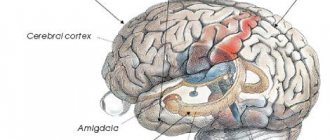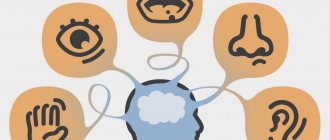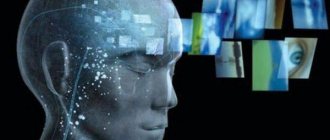Memory is the basis of a person’s personality, a kind of foundation on which his behavior and way of thinking as a whole are built. It ensures the accumulation of new impressions, abilities, skills and their further application. By and large, severe memory impairment is a degradation of personality, since along with memories, habits, desires, aspirations disappear, and life values completely change. Fixation amnesia is one of the forms of mnestic disorders in which the patient does not remember and cannot remember current and recent events; memories of the distant past are partially preserved. The syndrome necessarily requires a comprehensive diagnosis, since doctors at the Leto mental health center determine treatment tactics based on the cause of the disease. Our specialists not only help patients with fixation amnesia, but also provide psychological support to their relatives, who often find it extremely difficult to accept and adequately respond to what is happening.
General description of the syndrome
Despite the huge number of different studies and publications, the process of memorizing and reproducing information is one of the most poorly studied, by the way, which is why the treatment of mnestic syndrome sometimes comes down to supportive and symptomatic therapy.
There are several memory processes:
- Memorization or fixation. This is the ability to form new neural connections, which ensure retention of a certain image in memory. The duration of memory retention is influenced by several factors: the degree of interest, content, well-being and emotional state at the time of receiving information.
- Retention (preservation). This is a kind of “processing” of information, during which everything unnecessary (from the point of view of a particular person) is “discarded” and only its essence remains.
- Playback. This is the process of “retrieving” images from memory. It can be involuntary, for example, some music or smell is associated with a certain event, and voluntary, when a person remembers what is necessary at that particular moment.
- Recognition is the subconscious comparison of a new image with something previously seen or heard.
- Forgetting. This is a completely physiological state when events that are uninteresting for an individual are gradually “erased”.
In patients with fixation amnesia, it is the process of memorizing new information that is impaired, but retention, reproduction and recognition are partially preserved. They do not lose previously acquired professional skills, subconscious reactions, behavior and communication with other people are preserved.
Diagnosis of memory disorders
Before prescribing treatment, the patient requires a systemic examination. The doctor conducts a conversation to collect anamnesis. During a conversation with the patient, he determines:
- period of pathology development;
- factors that caused disruption of brain activity;
- the presence of episodes of temporary memory loss in earlier periods of life.
After collecting anamnestic data, the physician performs a neurological examination, establishing:
- skin condition;
- gait characteristics;
- presence of oscillatory eye movements.
A patient suffering from memory loss due to a concussion fills out the necessary questionnaires and talks with a psychiatrist to diagnose intellectual and emotional problems. Electroencephalography, CT and MRI of the head are performed.
Causes
In psychiatry and neurology, fixation amnesia is not considered an independent disease; it is rather a syndrome that occurs against the background of a certain pathology. Typically, the etiology of this form of mnestic disorder is associated with:
- acute disorders of cerebral circulation due to stroke, rupture of an aneurysm, chronic cerebral hypoxia is characterized by gradual progression of mnestic disorders;
- traumatic brain injury;
- severe course of certain viral, bacterial or fungal infections, in particular meningitis, encephalitis, syphilis;
- decompensated epilepsy: if the patient either does not see a doctor for a long time, or it is not possible to find effective anticonvulsive therapy, frequent attacks cause severe dysfunction of the central nervous system;
- hepatic, discirculatory encephalopathy;
- acute and chronic intoxication with industrial and household poisons, drugs;
- benign and malignant neoplasms in the brain.
In addition, fixation amnesia is the main symptom of Korsakoff's syndrome. This is a degenerative pathology of the central nervous system, which develops against the background of prolonged deficiency of thiamine (vitamin B1). Vitamin deficiency can be a consequence of prolonged malnutrition, starvation, poor diet, and less commonly, impaired absorption of thiamine in the digestive tract. But the most common cause of Korsakoff syndrome is chronic alcoholism.
What can memory do?
Memory allows us to study and organize information and past events . This is closely related to attention, another basic psychological process. The process consists of three stages: encoding, storage and recall.
We can think of memory as a three-part psychological process by which we encode information, store it in the brain, and recall it when we need it. The most important part is that the information we learn is remembered when it is not right in front of us. Sometimes we remember things quickly and accurately, and sometimes with great difficulty.
Memory research in cognitive psychology and cognitive neuroscience shows that the brain has multiple memory systems. In turn, each of them has its own characteristics, functions and processes.
Clinical picture
Loss of fixation memory primarily affects the ability to remember current events. In particular, he cannot say what he ate for lunch or breakfast, or retell the content of a movie he just watched or an article he read. At the same time, he is able to quite adequately and logically maintain a conversation with his interlocutor, but after 15–20 minutes he assures that he was not talking to anyone.
The main signs of the syndrome also include severe disorientation. The patient remembers perfectly everything that happened to him before the episode, which provoked mnestic disturbances. But after this, when he wakes up in the morning, he is unable to reconstruct what happened yesterday, and if he is in a hospital, he does not understand where and why he is here.
In addition to impaired short-term memory, fixation amnesia is characterized by symptoms of the underlying disease, which became the cause of this syndrome. It can be:
- dizziness, headaches, which intensify with physical and emotional stress;
- nausea and vomiting;
- deterioration of hearing and speech, partial paralysis of the limbs, loss of sensitivity of the body;
- coordination problems;
- the formation of delusional ideas with the plot of persecution, mastery, jealousy;
- excessive drowsiness or, conversely, insomnia;
- lethargy, weakness, constant fatigue.
Fixation amnesia, which arose against the background of mental disorders, is characterized by confabulation - the replacement of absent memories of recent events with false ones. The patient does this unconsciously: he is convinced that everything was exactly as he says.
Treatment of amnesia
For amnesia, treatment is nonspecific and depends on the cause. Therapy focuses on strategies to help compensate for memory problems. The following approaches are used:
- Treatment of primary pathology: tumor removal, elimination of infection, etc.
- Creation of a favorable environment, normalization of work and rest regimes. After this, the first signs of improvement are visible. For patients with degenerative processes in the brain, this helps them adapt better and increase their ability to self-care.
- Drug therapy. Nootropic drugs, nicotinic acid derivatives, B vitamins, antipsychotics, vasoactive drugs and other drugs may be prescribed.
- Psychotherapy: necessary in the treatment of psychogenic amnesia. Allows you to recognize and work through problems associated with amnestic episodes. Work is carried out with relatives, hypnosuggestive therapy can be used.
Anyone can face risk factors for developing amnesia. Therefore, do not forget about simple preventive measures that will reduce the chance of a painful condition:
- Avoiding excessive alcohol consumption.
- Wearing a seat belt in a car and wearing a helmet when riding motorcycles and bicycles.
- Timely treatment of mental and infectious diseases.
- Seek immediate medical help if symptoms of an acute disorder of the cardiovascular, nervous or respiratory system occur. These symptoms include a sharp headache, increased blood pressure, numbness, partial paralysis and more.
- Seeing a psychotherapist in stressful situations.
- Good habits: regular medical examination, moderate physical activity, balanced diet.
In case of amnesia, only a qualified specialist will tell you what to do - due to the variety of clinical situations, an individual approach to each case is required. If you notice lapses or memory deterioration, do not ignore the problem: the sooner help is provided, the higher the likelihood of its return. But even if this function cannot be restored, modern medicine successfully helps patients stop the progression of the disease, adapt to the new condition and return to social life.
Cost of services
| CONSULTATIONS OF SPECIALISTS | |
| Initial consultation with a psychiatrist (60 min.) | 6,000 rub. |
| Repeated consultation | 5,000 rub. |
| Consultation with a psychiatrist-narcologist (60 min.) | 5,000 rub. |
| Consultation with a psychologist | 3,500 rub. |
| Consultation with Gromova E.V. (50 minutes) | 12,000 rub. |
| PSYCHOTHERAPY | |
| Psychotherapy (session) | 7,000 rub. |
| Psychotherapy (5 sessions) | 30,000 rub. |
| Psychotherapy (10 sessions) | 60,000 rub. |
| Group psychotherapy (3-7 people) | 3,500 rub. |
| Psychotherapy session with E.V. Gromova (50 minutes) | 12,000 rub. |
This list does not contain all prices for services provided by our clinic. The full price list can be found on the “Prices” , or by calling: 8(969)060-93-93. Initial consultation is FREE!
Related brain regions
One of the main tasks of modern neurobiology is to find out which areas of the brain play a role in anterograde amnesia . In general, the brain damage that causes it is thought to occur in the hippocampus and medial temporal lobe.
These areas of the brain act as a passageway where events and facts are stored temporarily until they are stored more permanently in the frontal lobe. The hippocampus as a storage facility for short-term memory .
If it cannot store information correctly, it will not be able to reach the frontal lobe. This means that the brain cannot form long-term memories. In cases of partial amnesia, memories can be formed but have very little actual detail.
However, although the hippocampus may seem to be the most important area of anterograde amnesia, recent research suggests that other brain structures also play a role . In particular, damage to the basal forebrain also appears to interrupt memory formation.
This area is responsible for the production of acetylcholine, a very important substance for memory function, initiation and modulation of the processes involved. The most common type of brain injury is an aneurysm, which is often associated with anterograde amnesia.
Finally, the association between amnesia and Korsakoff's syndrome points to a third area that may play a role in the development of anterograde amnesia. The diencephalon is the area that is affected by Korsakoff's syndrome. Recently, researchers have begun to study the involvement of the diencephalon in amnesia.
Definition
According to the teachings of psychologists Charcot and Joseph Breuer, amnesia is a consequence of a traumatic situation.
Under conditions of severe stress and emotional excitement, some people experience a state of self-hypnosis, when individual memories associated with negative experiences are automatically encoded. In this regard, gaps appear in a person’s memory that cannot be restored without the help of a qualified psychoanalyst.
Access to memories that have been lost due to the onset of psychogenic amnesia can only be gained if the sick person is put into an altered state.
For this, trance and hypnotic techniques are used. Joseph Breuer was convinced that memory restoration is possible only by using an integrated approach, which includes hypnosis, putting the patient into a trance, and also introducing high-quality analytical work.
In this case, it is very important that the patient’s personal identity is established, as well as the circumstances that led to the appearance of the amnestic barrier.
Psychological theories and schools
Since the beginning of the 19th century, amnesia has been carefully studied by European doctors specializing in the field of psychoanalysis, neurology, and psychiatry. In this regard, the first psychological theories, concepts and schools regarding the psychogenic nature of memory loss begin to form.
School of Jean-Martin Charcot
Jean-Martin Charcot is a French psychiatrist and famous teacher who had a large number of students and followers, and his practice spans the period from 1845 to 1880. According to the theory of this scientist, amnesia of a psychological origin is caused by hysterical states of a person, as well as the presence of accompanying diseases of neurological origin.
Pierre Janet School
Pierre Janet is a world-famous French neurologist, psychiatrist, and psychologist, who created many scientific works devoted to the psychogenic theory of amnesia. According to the concept of this scientist, the psychological cause of memory loss is associated with an imbalance between the lower and higher mental functions of the human central nervous system. Stress, mental shock, psycho-emotional overstrain act only as a catalyst for amnesia.
Sigmund Freud School
The theory of the psychological origin of amnesia, which was put forward by Sigmund Freud, lies in the obligatory presence of previously experienced stress or severe mental trauma. On this basis, the patient develops an acute internal conflict, accompanied by regression of libido. Defense mechanisms of the psyche are developed, which lead to complete or partial loss of memory.
Forms of manifestations
Amnesia is (in psychology, this human condition is considered painful and requires complex treatment) pathology, which has 2 main forms of its manifestation.
Stationary
This form of memory loss can also be called chronic. In this case, the person has a complete absence of any memories that took place before the moment of psychological trauma or a stressful situation. The amnestic barrier is strong, persists for several months, or is present for years.
Memory recovery does not occur under any circumstances, but there are also no signs of disease progression. Psychologically, the stationary form of amnesia reduces a person’s quality of life, but still 65% of people manage to adapt and adjust to the current circumstances.
Regressive
The regressive form of amnesia is characterized by an improvement in clinical dynamics towards the restoration of individual fragments of memories . The patient begins to gradually remember all the events that were present in his life before receiving psychological trauma or experiencing stress.
This form of amnesia is extremely dangerous for a person’s mental health, since it is possible to re-experience negative emotions and memories. Patients with signs of regressive memory loss should regularly visit a psychoanalyst, be under the supervision of a psychologist, psychotherapist, and also receive round-the-clock support from loved ones.
Prevention
There are no methods of prevention as such. We can give general recommendations:
- Minimum stress. It's better to avoid them altogether. If this is not possible, mastering relaxation techniques is indicated.
- Timely treatment of all infectious and inflammatory pathologies.
- Constant mental load at an adequate level. Helps reduce the risk of Alzheimer's disease.
- Maintaining immunity.
- Avoiding injuries and blows to the head.
- Quitting alcohol, smoking, and drugs.











